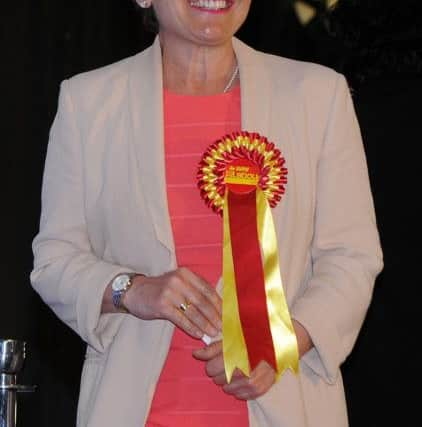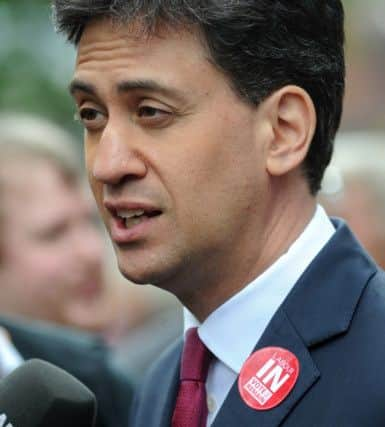FEATURE: Why are wages in Doncaster lower now than they were four years ago?


But after figures from the Government’s Office for National Statistics revealed that the average wage in Doncaster is lower now than it was four years ago - it appears many people across the borough are yet to see the benefits in their pay packets. The average wage in Doncaster was £18,721 in 2015 – some £26 less than it was in 2011 when the mean income was £18,746, according to the Government’s Office of National Statistics.
The drop is in spite of wages being further diminished by inflation – which is the measure of how much the cost of goods and services increases by each year.


Advertisement
Hide AdAdvertisement
Hide AdNationally, the average salary rose from £26,200 in 2011 to £26,500 in 2015.
Don Valley MP Caroline Flint said: “The Doncaster Free Press is right to draw attention to many working people in Doncaster who are on low wages in insecure jobs.
“It is a situation all of us should be concerned about. Some don’t know how many hours work they’ll get each week, with women and young people the majority of these workers.
“For Doncaster to succeed we need to build a local economy that provides greater security of employment, the opportunity to progress from minimum wage and a skilled workforce to attract better paid jobs.


Advertisement
Hide AdAdvertisement
Hide Ad“We need to interrogate what is going on to create such employment insecurity sector by sector.
“I will work with any public, private or voluntary partners to identify what we can do locally.”
The borough is one of 12 places across the country – including Nottingham, Bexley and Buckinghamshire – where wages have fallen between 2011 and 2015.
However, the average income is lower in Doncaster than in any of the other affected towns and cities.


Advertisement
Hide AdAdvertisement
Hide AdWhile the average annual wage in Doncaster has fallen over the last four years, there has been a slight increase in the average income of women.
Women in Doncaster earned an average of £14,513 in 2015, compared with £13,970 in 2011.
In contrast, the average wage for men in Doncaster decreased from £24,254 in 2011 to £24,133 last year.
Bill Adams, Regional Secretary of the Yorkshire and the Humber TUC said: “Since the global financial crash workers across the UK have been made to pay a heavy price for a crisis they did not cause. Wages have fallen significantly and insecurity has risen in contrast to many other countries within Europe. Tory government ministers have shamefully let the bankers, big business and the super-rich off the hook while pursuing policies that have squeezed wages for the majority of working people.”


Advertisement
Hide AdAdvertisement
Hide Ad“Ordinary workers in Doncaster have been punished harder than most with already low wages falling further. People in Doncaster want to work and deserve fair pay to support themselves and their families. The government must recognise that Doncaster needs a pay rise and then do something about it. We need greater national investment in South Yorkshire with an emphasis on creating quality jobs along with practical policies to help improve incomes and boost spending power in the local economy. It’s time this government recognised that their extreme austerity policies are dragging down whole communities and preventing a real recovery for working people.”
Commenting on the pay gap between men and women in the borough, Doncaster Central MP, Rosie Winterton, said: “Women should obviously be paid the same as men for doing the same job and it is welcome that Section 78 of the Equality Act 2010, introduced by the Labour Government, is finally being implemented. This means that from October 2016 it will be compulsory for private sector and voluntary organisations employing more than 250 people to report on gender pay gaps. I would urge the Government to ensure that this is also rolled out to the public sector as soon as possible.”
Ros Jones, Mayor of Doncaster said: “From day one as Mayor, I have always been clear that creating jobs and driving economic growth are my top priority and it is statistics like these that show why this approach is so important.
“On many occasions I have said we need more quality, well-paid jobs and we need to ensure local people can gain the skills they need to secure those jobs. The good news is that we are making significant progress on that front.
Advertisement
Hide AdAdvertisement
Hide Ad“Doncaster is creating private sector jobs at a faster rate than the England average and the business base has also increased at a higher rate. Doncaster is poised to deliver at least 12,000 additional jobs by 2024 and about 40 per cent of these will be highly skilled.
“Linked to this, I also took the radical approach to introduce the Education and Skills Commission to make sure that local young people have the skills, abilities and qualifications needed to secure the new jobs being created across the borough and those further afield.


“We have solid foundations and plans in place which help our residents acquire the skills to benefit from the growth, support our businesses to create quality jobs and attract new investment across the borough. Doncaster is on the up!”
Doncaster North MP Ed Miliband said: “These devastating figures show that the people of Doncaster have been paying the price of Tory failure in their pay packets. While the government was boasting, living standards were falling.
Advertisement
Hide AdAdvertisement
Hide Ad“The answer is to scrap the failing plan of austerity and low wages and replace it with a new way forward based on high skills and high wages.
“Theresa May’s government should be supporting the efforts of Doncaster’s mayor, Ros Jones, and its businesses with investment in the borough’s infrastructure, skills, employment and housing.
“We cannot go on with a Tory recovery which supports the few and not the many.”
Dan Fell, CEO, Doncaster Chamber said: “The Chamber is confident that Doncaster’s economy is moving in the right direction. The borough is creating private sector jobs ahead of the national average, has some of the best growth statistics in the region and – in recent years – has delivered some major infrastructure projects that will lay the foundations for future success. Regrettably, wages in Doncaster have not yet caught up with that step change.
Advertisement
Hide AdAdvertisement
Hide Ad“There will be many reasons for that. These include: Doncaster’s comparatively high dependency on the public sector as an employer, the high proportion of very small businesses that we have in the borough, and a lack of highly skilled jobs.
“There is no quick fix to this but sustained investment in the borough’s education system – via initiatives such as the High Speed Rail College and University Technical College – will help, in the fullness of time, with the creation of more highly skilled and better paid jobs but, unfortunately, this cannot be achieved overnight.
“The disparity between men and women’s wages in Doncaster is a very serious concern. Some interventions are in place already to address gender inequality. For example, there will be a high degree of emphasis on recruiting young women into Doncaster’s new learning institutions and the Chamber runs dedicated Women In Business forums. However, it is very clear that Doncaster has a lot of work to do in this area and I would encourage all partners to redouble efforts in tackling gender inequality.”
l Liz Coopey: “I blame tax credits, companies feel that the taxpayer will top up the meagre wages they pay, governments should make large companies pay a living wage of at least £10 per hour. No wonder CEOs are laughing all the way to the bank!
Advertisement
Hide AdAdvertisement
Hide Adl Claire Jones: “Not surprising at all. The bills keep rising but the wages and workers rights keep being hindered at every turn. Out the Tories! They’ve stripped everything so far back and wonder why we struggle. Never heard of food banks before they came into power. Where is the local MP- Ed these days? Would like to know what he’s got to say about his constituency.”
l Lee Buckle: “Well we have Doncaster council to thank for flooding the town with bars and call centres for that. Not the kind of investment we need.”
l Nic Fritz: “Not surprising. Just look around. A lot of good areas being run into the ground as cannot afford repairs etc. Always sales on in town and no one is buying.”
l Kay Marsh: “Mine’s lower now in 2016 working in retail than when I worked in a factory in 2000 as I recently found my p60 and was amazed.”